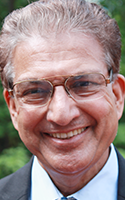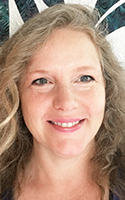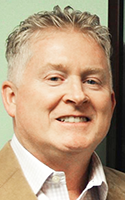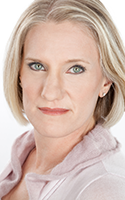Practitioners say more in the medical industry accepting the benefits of what they call ‘integrative medicine’
By Deborah Jeanne Sergeant
In recent years, non-Western medicine has grown in popularity and availability. Most insurers cover at least some modalities. According to the National Institutes of Health, more than 30 percent of adults and approximately 12 percent of children use non-Western health care.
A few prestigious medical schools have begun offering dual certification programs, which has raised the esteem for integrative practitioners. Well-known medical doctors such as Mehmet Oz, Deepak Chopra, Andrew Weil, and Mark Hyman also use and endorse modalities that originate outside Western medicine.
Physician Az Tahir practices holistic integrative medicine at Campanella Wellness in Rochester. In addition to his training as a medical doctor and post-graduate studies that specialized in several areas, he is a licensed massage therapist and has completed training in several types of massage, clinical hypnotherapy and homeopathy.
“It has been a slow journey to be accepted,” Tahir said. “Many doctors are seeing the benefits of complementary medicine.”
He said that among those who aren’t embracing complementary medicine are doctors that don’t see the connection between lifestyle and health. He recalled a patient he knows who was given a hamburger after colon cancer surgery, even though red meat has been identified as a contributory cause of colon cancer.
Tahir said that medical schools provide students with little education about nutrition and the benefits of modalities such as relaxation, aromatherapy and other basics of complementary medicine.
“It’s unfair the patients don’t get the benefit of complementary medicine,” Tahir said. “With treating cancer, some of my colleagues are doing a good job in providing all the options and others are just saying ‘Surgery, chemotherapy and radiation are the only options.’”
He hopes that patients continue to push for more approval of complementary medicine so that it will become more accepted.
Marge Pickering Picone, certified nutrition consultant and owner of Professional Nutrition Services in Webster, said that lack of research has hampered acceptance of some modalities among medical doctors.
“It takes years and lots of money to get things proven,” she said.
She said that Western medicine tends to rely more on research studies than relying upon how an individual patient’s body responds to treatment.
Much of her work is helping people address negative side effects of medication and promoting wellness to prevent illness. She said that most physicians focus on mitigating the symptoms of chronic problems.
Physician Leila Kirdani practiced Western medicine for 15 years before founding Quality of Life Medicine in Rochester. She is board-certified in both metabolic medicine and family practice.
Her practice specializes in hormone balancing, improving gut health, clearing toxins and promoting a healthy diet and lifestyle.
“What I hear from patients is a great deal of dissatisfaction with traditional providers, that they are being more tightly bound by insurance companies as to what testing they’re willing and able to provide,” Kirdani said.
According to the National Institutes of Health, more than 30 percent of adults and approximately 12 percent of children use non-Western health care.
She said that some medical practices don’t touch on lifestyle interventions such as diet and exercise that can reduce the need for medical intervention.
“There’s a complete disconnect between diet and the health of the body,” Kirdani said. “We get only a few hours of nutrition education in medical school. Our bodies are made up of nutrients. I just had a patient with heart disease whose doctor said what he eats makes no difference.”
She hopes that a grassroots movement among patients who want more choices will continue to push insurance companies toward covering more services. In the meantime, she wants people who are dissatisfied with their medical care to look for a provider open to the complementary treatments in which they’re interested.
Les Moore, doctor of naturopathic medicine, directs the Center for Special Medicine in Pittsford. The practice focuses on multiple chronic disease and pain syndrome, autoimmune disorders, digestive disorders, sinusitis, allergies, environmental illness, chronic fatigue, burnout syndrome, and other difficult and recalcitrant diseases. Moore practices multiple modalities of naturopathic and Chinese medicine and homeopathy.
While he believes that integrative medicine is becoming more popular, “those who are against it are becoming more vocal,” he said. “There are conventional practitioners who incorporate various methods of natural medicine into their therapies. If it’s good medicine, it’s good medicine. I don’t think as many people are threatened by it. They find they can help some of their patients.”
He thinks that the push for self-care and preventive health has helped drive interest in non-Western health. Many of his clients ask if he’s aware of a medical doctor who’s open to or who uses integrative medicine.
Tracy McIntyre, licensed massage therapist and owner of Hands That Heal Massage and Wellness Center in Pittsford, wants more people to know that massage therapy and other modalities can help reduce their need for medication. She thinks complementary medicine is following in the footsteps of chiropractic and acupuncture as becoming more and more accepted.
“I think people being sick and tired of being on so much medicine and they want healthier ways of taking care of their bodies rather than polluting it,” she said.
She hopes that more institutions begin offering a higher standard of education in complementary modalities so that the medical community would take it more seriously.



![]()
 Experts we spoke with, from left, are Leila Kirdani, Marge Pickering Picone, Les Moore, Tracy McIntyre, Az Tahir
Experts we spoke with, from left, are Leila Kirdani, Marge Pickering Picone, Les Moore, Tracy McIntyre, Az Tahir

